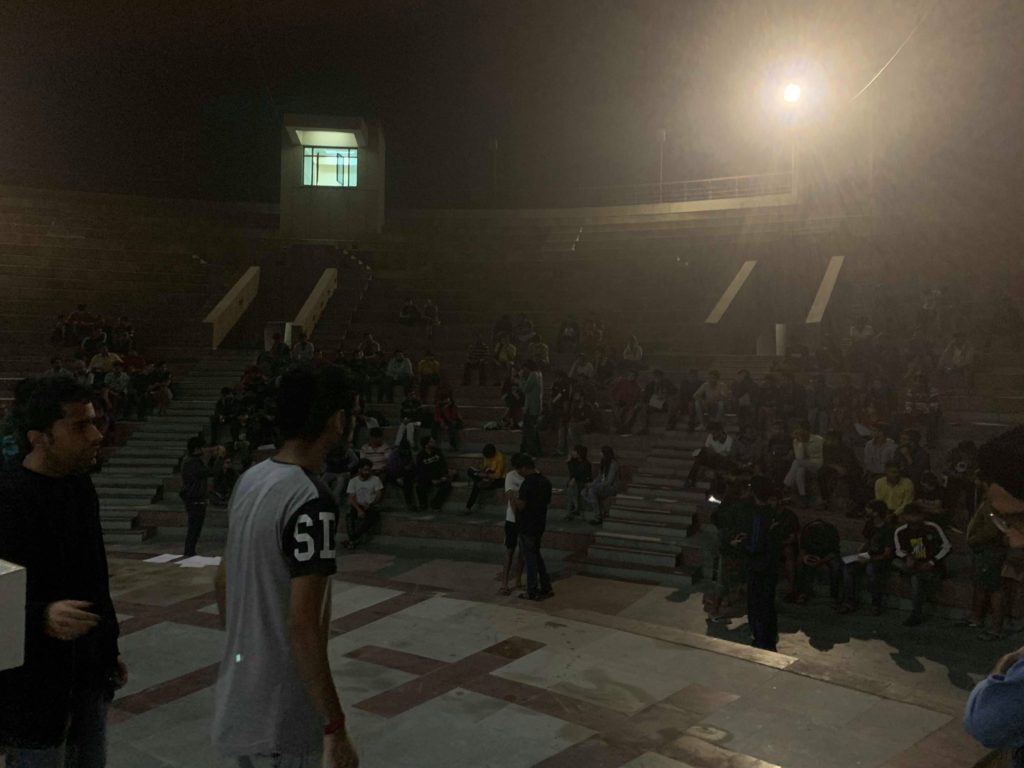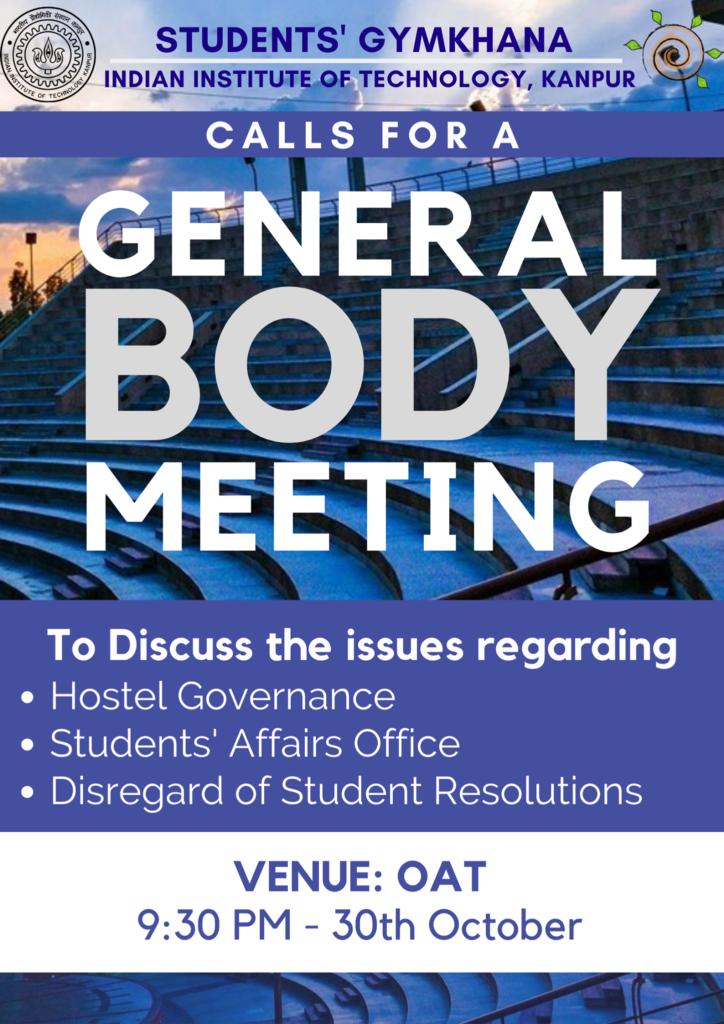On 30th October 2019, a General Body Meeting (GBM) was called by the Students’ Gymkhana to address several issues that needed public discourse. Three main agendas that were pushed in the meeting by Student Gymkhana executives were Hostel Governance, Issues with the Student Affairs Office, and Disregard of Student Resolutions by the administration.
It started with a recent issue wherein three students from Hall 8 were given eviction notices allegedly for having a verbal spat with the warden in a hall level GBM. The warden demanded unconditional apologies from the students. While two students gave an unconditional apology, one student was asked to vacate the hall because the mail sent by him challenged the argument given by the wardens. A similar past incident from Hall 11, wherein the HEC alleges that the Warden In Charge revoked the mailing rights of student members and disregarded the mandate of the same, was brought into the light.
The Student Executives collectively claimed that although as per the institute ordinances, the Warden-in-Charge of the concerned hall of residence has the power to reprimand /impose fine or take any other such suitable measure against any resident of the hall, who violates either the rules and regulations or the Code of Conduct pertaining to the concerned hall of residence, no documents clearly state that the warden can evict a resident, in cases like those of Hall 8.
They highlighted some “fundamental” flaws in the Hall Management policy of the institute like the non-implementation of Hall Constitutions. They pointed out that although some halls do have a constitution, they have not been ratified by the Academic Senate, while other halls simply don’t have one. To ensure better management, they proposed the idea of a Model Constitution currently in discussion at the Council of Students for Hostel Affairs (CoSHA) to be itemised and approved by the Academic Senate. All halls will be required to submit a constitution within a reasonable timeline, with the Model Constitution as the basis.
One of the key issues that were raised was the lack of involvement of HEC in the appointment of Warden In Charge, wherein the current system involves appointment by the Director, on the recommendation of DOSA that is discussed with the Associate Dean Hostel Affairs (ADHA), with no real involvement of HEC. To ensure a better connect between HEC and Hall Administration, it was proposed that as a policy, HEC members could recommend three names with an order of preference to the Dean, Students’ Affairs which will be discussed in a committee and forwarded to the Director. Lack of proper redressal mechanism for disputes between hall members and wardens was also raised.
One particular matter related to accommodation of MS by Research (MSR) students was also highlighted. The duration of the stay of MSR students is not defined, but the hall administration treats them as extended students after a duration of 2-years. These students are not provided with proper accommodation, and they cannot even present their case to anyone because the warden has supreme authority over the issue. It was pointed out that these are some loopholes in the system which really need to be looked into.
The GBM also highlighted the problems with the general demeanour, attitude, and actions of the Associate Dean of Students’ Affairs. The student representatives claimed to have experienced a structural exclusion from the system on multiple fronts which warns of a scary shift in the administration’s outlook towards students’ say on campus issues. Unavailability in his office and on other media, unreasonable demands and unprofessional demeaning comments towards certain students have served as major hindrances in the communication of the Associate Dean Student Affairs (ADSA), with the students. In an executive dissent, the Festival Coordinators of the three festivals along with all the Gymkhana executives raised issues regarding delays in the approval of a lot of permissions and MoUs in this tedious bureaucratic process, exclusion from strangely timed Gymkhana Festival Advisory Committee (GFAC) meetings and the changes proposed in handling festival finances.
Another important issue that was discussed was the disregard of the resolutions passed by the Students’ Senate. A recent office order barred students previously punished by the SSAC (Senate Student Affairs Committee) to hold any positions of responsibility in the Students’ Gymkhana in the future. The executives expressed dissent over this order and felt that this deprives the students who have redeemed themselves from the probation period from gaining essential co-curricular learning and is detrimental for mental well-being as well. As the provision of disciplinary probation with the clause of disallowing students to hold any position of responsibility is already in place, they feel that SSAC should reserve the discretion to award appropriate action on a case to case basis. Additionally, the Students’ Senate feels that a modification to the SSAC manual without being approved by the Academic Senate violates due procedure and undermines the authority of the Academic Senate as the highest decision-making body within the institute.
Student’s Gymkhana plans on starting a public signature campaign to convey these issues and garner public support, and then take them to the Director’s Office. They also plan on re-conducting a GBM, this time preferably with the Director present, to give him a better perspective on these problems. The next step would be planned based on his overall response to the issues.
To make democracy work, we must be a nation of participants, not simply observers. IITK has had a rich legacy of active students’ participation in various fields throughout the years. This GBM attempted to draw upon that legacy and unite the students in order to solve the issues prevailing in the campus. Only time would tell whether this GBM succeeded in doing so.










































